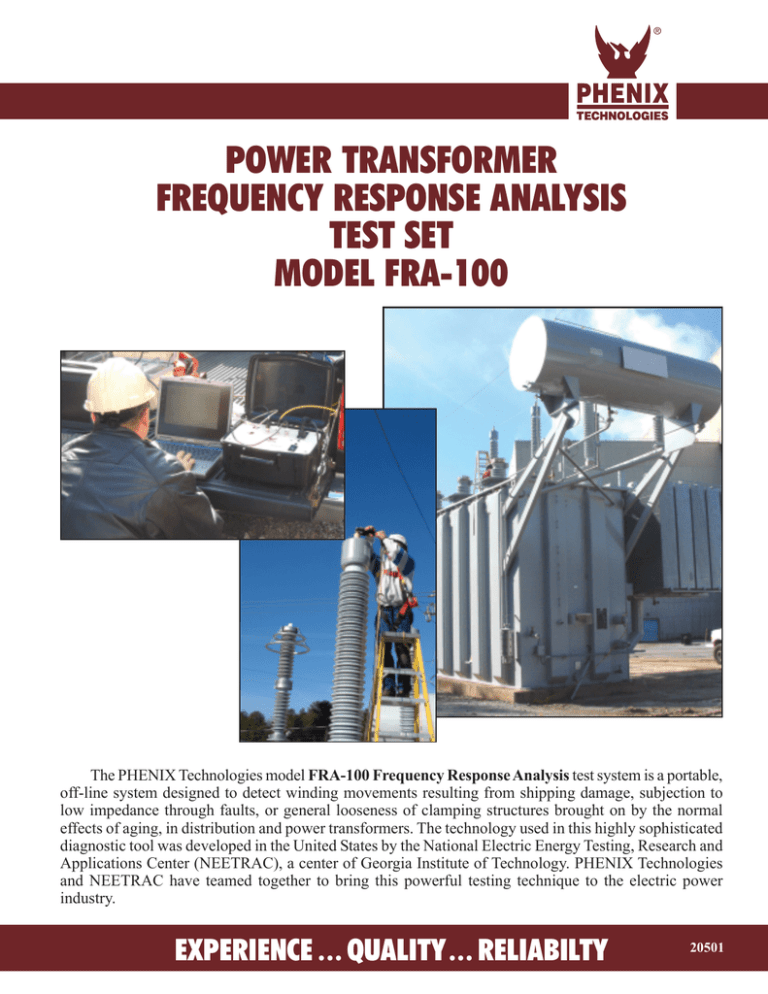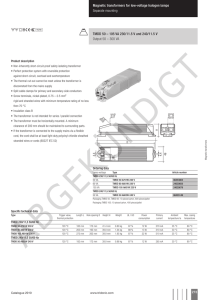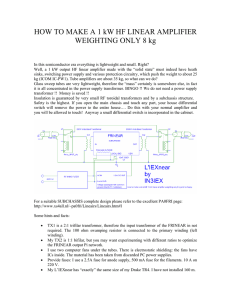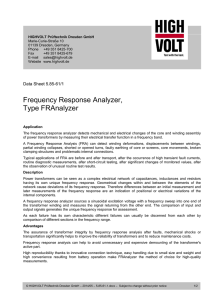
®
POWER TRANSFORMER
FREQUENCY RESPONSE ANALYSIS
TEST SET
MODEL FRA-100
The PHENIX Technologies model FRA-100 Frequency Response Analysis test system is a portable,
off-line system designed to detect winding movements resulting from shipping damage, subjection to
low impedance through faults, or general looseness of clamping structures brought on by the normal
effects of aging, in distribution and power transformers. The technology used in this highly sophisticated
diagnostic tool was developed in the United States by the National Electric Energy Testing, Research and
Applications Center (NEETRAC), a center of Georgia Institute of Technology. PHENIX Technologies
and NEETRAC have teamed together to bring this powerful testing technique to the electric power
industry.
EXPERIENCE . . . QUALITY . . . RELIABILTY
20501
THEORETICAL BACKGROUND:
The test is accomplished through the application
and subsequent analysis of a series of low voltage
impulses of varying duration, and approximately 300
V magnitude. Based on the resulting current impulse
measured by the current probe, the frequency response
is calculated for frequencies up to 5 MHz. This
technique is designed to detect winding shifts through
non-destructive methods, and can either be used as a
stand alone test to detect winding damage, or as a
diagnostic tool to pinpoint damages discovered in other
test results such as insulation power factor tests,
dissolved gas analysis, or short circuit impedance.
The testing software provided calculates objective
estimates of the degree of movement based on two
different patented analysis techniques, the Weighted
Normalized Difference (WND) number is used in
analysis of all types of transformers, and the Objective
Winding Asymmetry (OWA) percentage, for use
especially on three phase transformers and single phase
identical sister units.
Basic WND analysis allows comparison to
previous FRA “fingerprints”, baseline data that may
have been made on the transformer at the factory, or at
an earlier date in the substation. This alone can be used
as an effective technique to detect winding damages.
The more advanced OWA technique has been
developed especially for use in cases where no baseline
data exists, but a condition assessment of the
mechanical integrity of the windings is still required.
This technique may be used very effectively in cases
both with and without baseline data to detect and
pinpoint damages to a specific phase and winding. This
is accomplished through an objective (numerical)
comparison of the three individual phase responses
against each other, and a knowledge of the fact that
while the individual phase responses of a three phase
transformer are not identical, they should differ from
each other in a predictable manner based on the
symmetrical design and construction of the
transformer.
Even though the OWA test method has been
shown to be very successful in locating mechanical
winding shifts without historical data, development
testing has shown that the most sensitive indicator of
winding damage may result from the combination of
the OWA test and the historical comparison.
Comparison of a previous OWA test result to a present
OWA test result on a given transformer provides a
means of comparing differences in the frequency
response records obtained from the same transformer
at different times that is largely unaffected by variables
such as temperature and oil condition, since changes
in these parameters have a common influence on the
phase-to-phase frequency response comparison.
Extensive development testing has been done
over a wide range of transformers in the power range
of a several hundred kVA distribution transformers
through several hundred MVA Class I, Class II
substation and generator step up transformers to
determine the evaluation criteria used in the PHENIX
Technologies FRA-100 system. The OWA technology
has been the only technology to date that has shown
the ability to detect and locate problems on
transformers even after they have been de-tanked, and
have had their leads cut and bushings removed!
Typical 3-Phase Transformer
Transfer Function Plots with
OWA Results Displayed
HARDWARE:
System Power Requirements
Battery Operated for Onsite Use
100 to 240 VAC, 50 or 60 Hz source for charging
Digitizer Data
Resolution: .................................... 12 bit
Number of Channels: .................... 2
Sampling Rate (per Channel) ........ 50Ms/sec
Lap Top PC (included)
Processor: ...................................... Intel Pentium
Operating System: ......................... Windows
Monitor: ........................................ Color LCD
Compact Disc Drive: ..................... CDRW
Power Supply: ............................... 100 to 240 VAC,
50 or 60 Hz, with
internal battery for
on site use
Current Probe
Type: .............................................. Low Inductance
Shunt
Resistance: ..................................... 10 Ω
Test Leads
All required test leads and clamps are provided, with pulse
output and signal measuring leads provided in 60 Ft lengths.
This allows the test technician to locate the PC and pulse
source at ground level while performing the test.
Note: Due to continual development, specifications are
subject to change without notice.
DIMENSIONS AND WEIGHTS:
FRA-100 Pulse Source with Digitizer
14" W x 11" D x 6½" H; 21 lbs.
Laptop Computer
13" W x 11" D x 1½" H; 8 lbs.
Cable Lead Bag
19" W x 10" D x 10" H; 17 lbs.
IMPULSE SOURCE:
An internal 300 V impulse source provides the exciting
impulses required for the FRA test. The pulse source is
automatically controlled by the PC, with all pulse
application and data collection being managed by the test
computer, following an initiation command by the test
technician to acknowledge that the test leads have been
connected to the proper terminals of the transformer, and
that all personnel are clear of the test leads.
For each connection configuration, the PC will collect
data from a series of ten applied impulses. Each impulse is
of approximately 300 V magnitude, with a steep rise time
on the order of a few hundred nanoseconds, and a variable
time to chop that is controlled by the test set computer that
ranges over a time interval of approximately 10 to 90
microseconds during the series of 10 applied impulses.
“FRA-100 Test System Components”
SOFTWARE ANALYSIS AND DATA
MANAGEMENT PACKAGE
The FRA-100 software package is a Windows based
application that provides both testing control as well as data
management functions.
Upon selecting the type of transformer from a list of
standard single phase, three phase and auto connections,
the software provides prompts to the user to connect the
leads and initiate each sequence of impulses. Built in safety
checks will prompt the user if there is a problem with the
lead connection that is recognized by the computer, based
on the data collected.
In addition, on three phase transformers the test
technician can select whether or not he or she wants to
perform an OWA test on the transformer. The OWA test is
recommended on all three phase transformers even if a
comparison to historical data is also desired. The OWA test
has been shown to be generally the most sensitive to actual
mechanical changes in the winding geometry, while at the
same time looking over changes that commonly affect all
three phases, resulting from temperature differences, oil
condition, etc.
The data management portion of the software provides
for convenient storage and retrieval of test records, allowing
the comparison of both WND results and OWA results on
any two transformer test records that are selected. This
allows comparison between historical data and present data,
as well as comparison with the frequency response of sister
units if it is desired to make this comparison.
Main Test Screen Shot
A test report can be generated and stored that provides
the results of the comparison of any two test records selected,
and that provides written application guidelines that prompt
the test technician about possible reasons for the results
obtained, based on the type of transformer and the results
encountered. The guidelines are based on the extensive
development investigations performed during the development
of the FRA-100 test system, and provide valuable insight into
the results. Additionally, the software generates a Green/
Yellow/Red condition assessment as an immediate visual
indication to the test technician of whether a significant change
exists between frequency responses under comparison. This
visual condition assessment can be used as the basis in
deciding whether additional electrical tests or internal visual
inspections should be made on the transformer before
approving it to be energized in service.
COMPANY PROFILE
PHENIX TECHNOLOGIES is a leading manufacturer of high voltage, high current, and high power test systems
and components. Our test systems are in operation around the world satisfying the testing requirements of our customers.
Our 65,000 square foot headquarters is a modern manufacturing facility where all the major components of our
systems are produced. All aspects of electrical and mechanical design, software design and actual production are performed
in this facility and controlled by an ISO9001 quality program. Our engineers offer a unique blend of theoretical knowledge
and practical experience. Our ever-expanding Service & Calibration Department stands ready to assist you during and
after installation to insure years of trouble free service.
Our engineering resources, manufacturing capability and commitment to flexibility have earned us the reputation as
the supplier of choice. From portable test equipment to large, cutting edge automated test systems, PHENIX Technologies
provides solutions for your testing needs. You owe it to yourself to discuss your testing requirements with PHENIX
Technologies today.
®
Your Local Representative is:
4/05 © Copyright—Phenix Technologies, Inc., 2004. All rights reserved
75 Speicher Drive
Accident, MD 21520 USA
Tel: 301-746-8118 • Fax: 301-895-5570
e-mail: info@phenixtech.com
http://www.phenixtech.com



